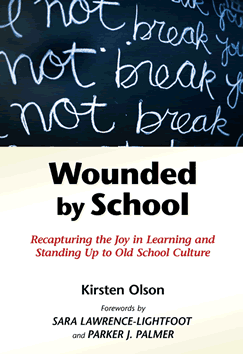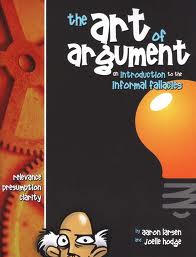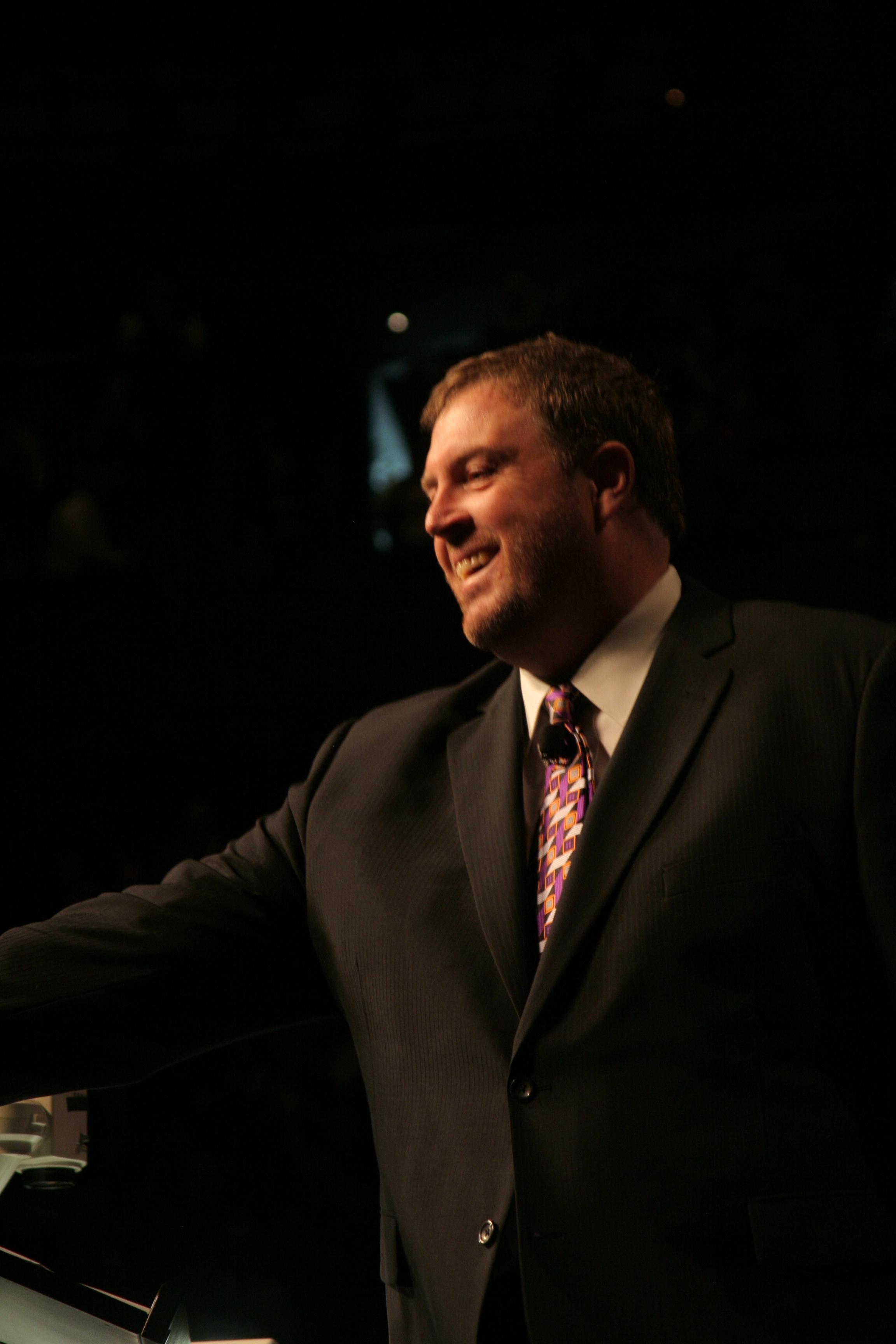Wounded by School (book review)
June 14th, 2013 // 10:13 am @ Oliver DeMille
Another important book about freedom (and the lack of it) in modern education is Wounded by School by Kirsten Olson. It outlines the normal ways in which modern education hurts most children, shows the history of why schools adopt such harmful policies, and suggests real solutions.
 For example, Olson writes: “Many theorists suggest that the purpose of schools is to mold and shape individual self-concept so that pupils will accept a particular place in society…” Is this really what you want for your children?
For example, Olson writes: “Many theorists suggest that the purpose of schools is to mold and shape individual self-concept so that pupils will accept a particular place in society…” Is this really what you want for your children?
On a larger scale, what is the impact on freedom of raising a generation of youth to “accept a particular place in society”? This is a class system, pure and simple.
Olson points out that “Schools are deliberately designed to sort and track” students into order to promote the class system. Olson also suggests that among the key ways modern schools wound students are things like the following:
- I felt sick in school.
- I’m in the middle.
- I must comply.
- I can’t measure up.
- I am better than those below me.
- I must impress my superiors.
- What I want isn’t as important as what my betters want.
- Creativity must be secret—my focus must be conformity.
- Learning isn’t fun.
And for parents: “I feel helpless about saving my child,” and “The experts know what my kids need more than I do.”
Olson’s solutions center around bringing freedom back into schooling. Indeed, this is the focus of a lot of cutting-edge books and research on education.
Above all, we need to be clear about one thing: Freedom works. It does. Freedom is the best choice in society and also in education. If you are a parent or teacher, you have more power than you know. I highly recommend this book.
Category : Blog &Book Reviews &Culture &Education &Family &Leadership
The Creativity Quotient
May 22nd, 2013 // 4:11 pm @ Oliver DeMille
 I recently learned about the Creativity Quotient (CQ) from an article by bestselling author Roy H. Williams.
I recently learned about the Creativity Quotient (CQ) from an article by bestselling author Roy H. Williams.
I’ve long been a fan of Williams’s Wizard Academy and his books, especially Wizard of Ads and Free the Beagle.
The Creativity Quotient provides a whole new level of analyzing education, and more people need to understand it.
As Williams put it: “All across America, our 2nd graders score higher on CQ tests than our high schoolers. Evidently, compliance and conformity come at a price. Children starting school this year will retire in 2072…. CQ is 3 times more reliable as an indicator of career success than IQ.”
This is a serious issue for a nation that is losing its leadership edge in the world—precisely because we don’t effectively teach innovation in most of our schools.
CQ measures four types of learning and thinking:
Fluency. This measures, according to Williams, “The total number of interpretable, meaningful, and relevant ideas developed in response to the stimulus.”
Flexibility. “The number of different categories of relevant responses.”
Originality. “The statistical rarity of the responses.”
Elaboration. “The amount of detail in the responses.”
Together these offer a profound, and effective, way of measuring how much a student has actually learned—and to what extent he or she is able to apply valuable knowledge.
This is a much more effective gauge of learning than IQ (Intelligent Quotient) or even the more current EQ (Emotional Intelligence).
Our nation needs this way of scrutinizing education.
The most recent educational trend, at least in the public school system, is known as “accountability,” but this has followed the pattern of Education 2000 and No Child Left Behind, meaning that it emphasizes conformity, rote learning, and institutional compliance rather than truly quality learning.
In contrast, CQ provides an objective measurement tool that can really get to the heart of great education.
If students consistently increase their fluency, flexibility, originality and elaboration skills in a certain school, classroom or home, the educational system there is clearly working.
If not, something needs to be improved.
If we applied this to all public and private schools, as well as higher education, we’d see the need to make real changes at almost all levels of schooling.
While all great education is ultimately individualized, CQ is the best institutionalized measure I’ve seen—because it seeks and measures objectives that actually have everything to do with quality education.
It’s about time.
In a world where nearly every institutional measure, including so-called “accountability,” has to do with benefitting the educational bureaucracy and justifying the status quo (especially current budgets), CQ can genuinely be used to improve the education of future leaders.
Whether this will catch on in any significant way remains to be seen, but most likely it will only be widely used in the non-traditional education sector, from cutting-edge charter schools and Montessori programs to home schools and upstart private schools (what Daniel Coyle has called “chicken-wire Harvards”).
I suppose it shouldn’t surprise anyone that schools focused on innovation are usually promoted by entrepreneurs and innovators rather than by the educational establishment.
Parents, teachers and educators who are genuinely interested in great education—more than trying to impress the declining but powerful educational bureaucracy—will find that CQ is a valuable tool.
Indeed, it was foreshadowed by bestselling futurist Alvin Toffler who wrote in Revolutionary Wealth that truly successful schools will replace rote memorization and a culture of intellectual conformity with creative thinking, personalized learning plans and individual mentoring.
Another way to say this is simply that great education is based on the principle of “Inspire, not Require,” as outlined in A Thomas Jefferson Education.
To summarize this view: Our children have genius inside, and the real purpose of education is to help them detect, develop and use their inner genius to serve and improve the world.
Most schools aren’t pursuing this fundamental goal of education any more, but parents, teachers and educators who really care can make sure that such learning is offered to the students they work with.
The 7 Keys of Thomas Jefferson Education outline how to do this.
This may seem idealistic to some people, but education is by definition concerned with ideals.
In fact, if anything, we need a lot more idealism in our educational system.
We need a serious return to innovation—the future of our nation and economy literally depends on it.
For those who are professional educators, either as teachers or administrators (or who have friends who are), I hope they’ll study and pass along the emerging ideals of CQ.
***********************************
 Oliver DeMille is the chairman of the Center for Social Leadership and co-creator of Thomas Jefferson Education.
Oliver DeMille is the chairman of the Center for Social Leadership and co-creator of Thomas Jefferson Education.
He is the author of A Thomas Jefferson Education: Teaching a Generation of Leaders for the 21st Century, and The Coming Aristocracy: Education & the Future of Freedom.
Oliver is dedicated to promoting freedom through leadership education. He and his wife Rachel are raising their eight children in Cedar City, Utah.
Category : Blog &Book Reviews &Education &Family &Featured &Leadership
How to Get More out of What You Read
March 13th, 2013 // 11:37 am @ Oliver DeMille
Two Books Reviewed by Oliver DeMille
 People often ask me if I’m going to write a book called Thomas Jefferson Education for Adults.
People often ask me if I’m going to write a book called Thomas Jefferson Education for Adults.
They usually say this after reading my books A Thomas Jefferson Education or A Thomas Jefferson Education for Teens, or both.
They get excited about getting a truly great education, not settling for anything less than the highest quality of learning for themselves and their children, and they wonder how to really get that kind of education themselves.
My answer is always, “Start reading the classics.”
When people follow this suggestion, many of them soon realize they’re not getting as much out of their reading as some people seem to.
When they ask how they can get more from their reading, I frequently tell them to study the logical fallacies.
Too many classrooms and schools today teach students what to think rather than how to think, and even many professional and graduate schools focus on when to think.
Teaching students how to think (deeply, broadly, creatively, innovatively, etc.) seems to be a lost art in too much of our modern educational system.
Two books on fallacies are an excellent response: The Art of Argument by Aaron Larsen, Joelle Hodge, and Chris Perrin, and Joseph Spider and the Fallacy Farm by David Grant.
Read these books together, since the first is an excellent workshop on how to think and the second is a fun story that will pull in younger students.
These books not only teach readers how to think, they inspire them to engage thinking.
In short, to think.
A lot.
Specifically, these two books teach a number of fallacies of thinking—in an interesting and effective way.
I highly recommend them for any youth, parent and teacher who wants to boost their students’ thinking ability.
In fact, both books are a great read for any adult.
When people know the fallacies, they automatically start thinking more deeply and they get a lot more out of everything they read—especially the classics.
So if you’re reading important books and want to significantly increase your rate of learning from them, check out these two books.
It’ll make a huge difference for your students and, even more importantly, for you.
***********************************
 Oliver DeMille is the chairman of the Center for Social Leadership and co-creator of Thomas Jefferson Education.
Oliver DeMille is the chairman of the Center for Social Leadership and co-creator of Thomas Jefferson Education.
He is the author of A Thomas Jefferson Education: Teaching a Generation of Leaders for the 21st Century, and The Coming Aristocracy: Education & the Future of Freedom.
Oliver is dedicated to promoting freedom through leadership education. He and his wife Rachel are raising their eight children in Cedar City, Utah.
Category : Blog &Book Reviews &Education &Featured
Shakespeare Goes to School?
August 13th, 2012 // 1:41 pm @ Oliver DeMille
 David Brooks wondered (The New York Times, July 5, 2012), what would Shakespeare’s Henry V have become as a leader if he had attended a current typical American school?
David Brooks wondered (The New York Times, July 5, 2012), what would Shakespeare’s Henry V have become as a leader if he had attended a current typical American school?
He wouldn’t be trained to fulfill the potential of his natural leadership abilities, he’d be cited for safety violations, suspended and labeled.
Whatever the label, he’d almost certainly be herded into a specific group and kept there year after year.
Brooks wrote:
“The education system has become culturally cohesive, rewarding and encouraging a certain sort of person: one who is nurturing, collaborative, disciplined, neat, studious, industrious and ambitious.”
In short, the kind of student who would make the most zealous Tiger Mom proud, the kind student who will grow into what C.S. Lewis called “Men Without Chests” and spending their lives on what author Sandra Tsing-Loh called “high-class drone work.”
In fact, such drone work has become the most widespread new definition of success in the corporate world.
We shouldn’t be surprised with this result.
After all, our education system in the Western world are perfectly aligned with this goal:
“Achieve, but don’t stand out too much. Succeed, but don’t alienate those around you. Fit in, be a team player, don’t rock the boat, impress the adults and you’ll get accolades, scholarships, and career success.”
The fact that in the new economy such attitudes are more likely to get Johnny or Mary a pink slip than a corner office is ignored by many parents and teachers.
And the reality that entrepreneurial success has a much higher probability of propelling Tommy or Sally to a higher standard of living than his or her parents, and in fact that this is the only thing likely to do so, is virtually never taught—except by two groups, parents who are successful entrepreneurs in their own right, and parents who are successful professionals.
Many such professionals now see that the medical, legal and other historically top-earning sectors are changing in ways that will end their run as upper-middle-class bastions of upward social mobility.
***********************************
 Oliver DeMille is the chairman of the Center for Social Leadership and co-creator of Thomas Jefferson Education.
Oliver DeMille is the chairman of the Center for Social Leadership and co-creator of Thomas Jefferson Education.
He is the author of A Thomas Jefferson Education: Teaching a Generation of Leaders for the 21st Century, and The Coming Aristocracy: Education & the Future of Freedom.
Oliver is dedicated to promoting freedom through leadership education. He and his wife Rachel are raising their eight children in Cedar City, Utah.
Category : Blog &Culture &Current Events &Education &Family &Leadership
The Education Event of the Summer
August 1st, 2012 // 12:09 pm @ ekdemille
 Featuring Oliver DeMille presenting:
Featuring Oliver DeMille presenting:
The New Approach to Leadership Education for the Decade Ahead
Click here to register now, or scroll down for more details…
-
How TJEd is different in the 4th Turning
-
The 7 Steps of TJEd (totally different than the 7 Keys)
-
Using the Trivium and Quadrivium to take TJEd to the next level
-
New directions for college and career in the newly emerging economy
-
…and much more!
Expand the vision, scope and application of Leadership Education in your home and in your mission, with this groundbreaking first-run seminar. This workshop is appropriate for seasoned and new TJEders, and everyone in between — as well as those educating in eclectic styles.
Bonus Gifts
To help you prepare for the coming school year, all registrants will receive the following free downloads* in addition to the webinar (all newly-produced especially for registrants of this event):
-
“A 2012 Update to the Foundations of TJEd”: mp3 audio presentation by Oliver DeMille
-
“The 1-Step Guide to Great Mentoring (How to Double the Quality of Your Mentoring in 2 Hours)”: mp3 audio presentation by Oliver DeMille
-
“A Guide to Family Reading”: e-book compiled by Rachel DeMille
-
An mp3 audio download of the entire Webinar for future listening
*These bonus gifts will be emailed to you with the link for the recording of the webinar after the date of the presentation.
*************
Webinar Details
Held Thursday, August 9, 2012
Event Time by Region:
- 3-5 p.m. Hawaii
- 5-7 p.m. Alaska
- 6-8 p.m. Pacific
- 7-9 p.m. Mountain
- 8-10 p.m. Central
- 9-11 p.m. Eastern
$19 per registrant (immediate family free on a shared computer)
Category : Blog &Education &Entrepreneurship &event &Family












